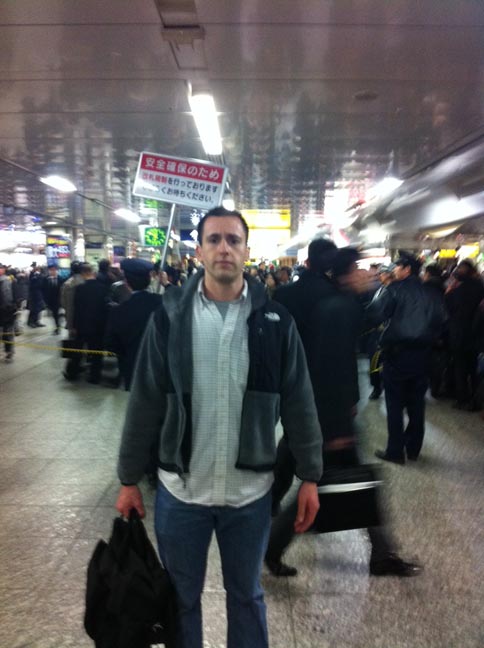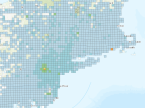Editor’s note: Alex Baynes, a class of 2000 graduate of the Martha’s Vineyard Regional High School, recently arrived in Yokosuka, Japan, near Tokyo, where he is serving as a Naval officer. The Gazette asked Mr. Baynes for an account of his experiences of last Friday’s devastating earthquake, and the impact of the tsunami and the nuclear facility concerns that followed.
The disaster here is pretty surreal in its magnitude. I have actually only been in Japan a few weeks. I’ve been trying to get settled in. I have a busy job out here, and the Navy gives you a good amount of time to get your life in order before work really starts to get going. There is a large adjustment period here in Yokosuka, because this isn’t just a typical change-of-duty station for the Navy; buying appliances, finding housing, driving a car and just going about your daily routine all take on a whole new meaning when you get over here and don’t speak a lick of Japanese.
In the next few weeks I will be taking over the ship superintendant position for the USS Mustin and have been prepping for this. My day-to-day life thus far has been about transitioning my life and my career to take over this new move and this new job.
Last Friday afternoon, I was in a two-story building near the USS George Washington. I was sitting in on a review and critique of a maintenance issue. There were about 20 people in the conference room, getting into the muck of this problem, when people kind of stopped working and started smirking and looking around.
I honestly had no idea what was going on yet. I lived in California for a couple of years but had never felt an earthquake. Apparently, it is routine out here; people were laughing because it is just a fact of life. But as the earthquake grew in intensity, I became aware — and people stopped laughing.
After about 30 seconds, I became fully aware that this was not a laughing matter. Finally, the highest ranking officer in the room made the right call and told us that we had to evacuate the building. I could definitely feel the building underneath me moving, and it wasn’t by any means just a vibration.
In an orderly yet rushing manner we made it downstairs and outside to a good place to muster. The earthquake seemed to continue for some time, and I would have to agree with the reports that said it lasted for a couple minutes. We stuck around outside for a little while and agreed, after debriefing with some people that had spent some years out here as well as some Japanese nationals, that this was not just a normal quake. It was larger than any of them had felt before.
People were pretty concerned. We waited about 30 minutes and then went back into the building to finish the meeting. The meeting had hardly started again when the whole process began again. And again, no laughing matter, we evacuated the building.
At this point the smart phones began to make their appearances, and people were already able to see video and news reports uploaded from the north and from Tokyo. We had gathered that the source was north of Tokyo, and people began to be pretty worried; if we were hit this hard, how had the north fared? After the second quake, we made the call for the day and started on our ways. Most commanders at the base let people out for the day. I went about my normal day and started my way back to the train.
Unfortunately I had no idea really at this point the effect the quake had had on the rest of Japan and what effects that it would have on everyone living here. I got to the train station and found they were already shut down, that they had been shut down for hours.
News dissemination can be very difficult here because it’s not put out, obviously, in English. A large group of people had formed. They were making announcements about what I can only imagine was the what, when, where, why and how of the situation. However, unable to understand Japanese, I found it hard to speculate on what was going on. A group of Americans that worked on base who depended on the trains to commute had queued with me, as well as the many Japanese nationals.
I spent the next five hours waiting and wondering if I’d get home that night and, if I didn’t, what would I do. It was cold, but I met a few people who spoke both languages, even if only marginally, who were friendly enough and wanted to practice their English; they helped interpret the messages. I also used this time to send some e-mails to family and friends, even if it was the middle of the night in the United States. The phone lines were down, however the data lines were still up, so people could e-mail and send instant messages on their cell phones for the most part. I sent my parents and my sister some e-mails letting them know that I was okay and everything was well, something for them to wake up to. I later heard that my parents had read my e-mail getting up in the morning before they ever even had heard the news about what had happened in Japan. So it worked out well, and my parents said they were able to somewhat skip the frantic and shock period that would have been a nightmare I’m sure for any parent. [Mr. Baynes’s parents, Leslie and Judy Baynes, live in Edgartown; his sister Amy lives in London.]
After some time waiting, we finally started to hear, through broken English, about tsunami warnings in the area. Finally a decision was made that the trains were shut down for the night. Amid the tsunami warnings, I decided to make it back to base because the only other option was to sleep at the train station and, though it is on higher ground, I was unfortunately unprepared to make it through the night in the clothes I was wearing. It was about 40-something degrees outside, and I don’t think it would have been the wise choice. I later found out many people had no option but to sleep at the stations.
I made it back to base and slept in the barracks of my command. It was pretty unnerving, with many tsunami horns and alerts going on through the night, because I was sleeping only about 50 meters from the ocean and about five meters above sea level; after all, it is a ship repair facility.
Unfortunately there was no where else to go. However I will say that this is just another moment, in a long line of moments, where I know I made the right decision for my career. How many other jobs make it there priority to make sure you’re taken care of in a situation like this? My safety, my housing, and that I was accounted for were definitely a priority. My command housed U.S. personnel as well as Japanese nationals who worked for the command that night who were dislocated.
Though I didn’t sleep that much that night, the next morning I awoke to see that the base had not fallen into the sea. The trains had started working again and I made the trek back to my apartment in Yokohama. My apartment, on the inside, hadn’t taken much damage. My furniture had definitely been shifted, and there were paint chips on the floor that had fallen off the ceiling.
I spent the weekend holed up in my apartment and around my immediate area. There were warnings beginning of rolling blackouts, and with the trains reliant on electrical power I didn’t want to get stuck anywhere again.
I surveyed the surrounding areas and saw some damage. Not anything like they are showing up north, but damage nonetheless. The grocery store I normally go to, that takes up an entire city block, had sunk and shifted about a foot. And this all on the busiest street in Yokohama, which is the second biggest city in Japan.
The news reports and videos continued to emerge and I saw very little different than I’m sure was shown globally. I knew however this was just the start. I had served in Pensacola, Fla., for a couple years, including directly after Hurricane Katrina and through Hurricane Dennis. After the initial blow, next comes the economic and logistical toll — the gas shortages, power outages, food shortages.
I made it back to work on Monday, though it took some work. The trains were unreliable and not on time. That night I again slept in the barracks because the trains were again stopped due to blackouts. Currently in my area there are gas shortages and trains aren’t always running — and when they are, they aren’t running at capacity. Unfortunately, there are gas refineries up north that were damaged. Also the electrical grid is very dependent, about 40 per cent, on nuclear energy, which is a problem in its own right; they were damaged and so the grid can’t be supported, and there is the concern of the radiological impact it will have here in the Japan.
Early this week, even down here in Yokosuka, we are starting to get minimal readings of radiological leakage from the damaged plants. At the moment, my life has only been inconvenienced and I’ve taken a few scares. However, that’s normal in my line of work. For the people up north it is a very different story, and I’m very thankful that I’m not giving you a first-hand account from there, and that I am able to give it.
[On Wednesday, Mr. Baynes added more to his account:]
One of the most marvelous observations I have been able to witness here in Japan is the strength of their people. They are stoic in nature. You could hear a pin drop on an overcrowded train. They are not outward, and as a result even after this disaster they have remained calm and are trying to get along with their lives even if the world is both literally and figuratively changing beneath them. It’s truly admirable.
Power outages are continuing and stores close early as part of a societal goal to conserve power. The threat and fear of radiological leakage is spreading. I have heard of a lot of foreigners and Japanese nationals leaving the country. My neighbors, a young couple, left today for Hong Kong to stay with family.
Life continues, and my biggest daily issue is the problem of information dissemination. News and Web sites are in Japanese, news at the base is updated on Facebook. There are plenty of clothing drives going on, with collections both on base and off base. It is winter here and there are people dislocated and without proper clothing. Winter jackets and good heavy clothing are being sought after at a premium.
We had an earthquake last night in the middle of the night and it was only about 5.9 [on the Richter scale]. I was up, out of my bed, out my door, down the narrow stairs and in the street in just my boxers in under 10 seconds. Trust me, Japanese housing is like an obstacle course. I’m sure I broke every cultural rule in this society.








Comments (1)
Comments
Comment policy »